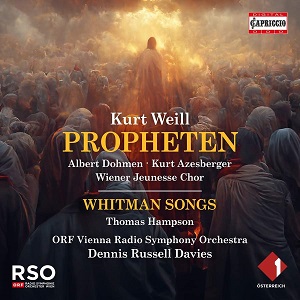
Kurt Weill (1900-1950)
Propheten – A Biblical Cantata from The Eternal Road (1935)
Four Walt Whitman Songs (1947)
Jeremias/The Voice of Solomon – Albert Dohmen (bass-baritone)
Rabbi – Kurt Azesberger (tenor)
Thomas Hampson (baritone: Whitman)
Wiener Jeunesse-Chor; Wiener Motettenchor; Gumpoldskirchner Spatzen
ORF Vienna Radio Symphony Orchestra/Dennis Russell Davies
rec. live, 28 May 1998, Vienna, Konzerthaus (Propheten); 30 July 2001, Salzburg, Felsenreitschule
German libretto with English translations (Propheten) and English texts with German translations (Whitman) enclosed
Reviewed as download from press preview
Capriccio C5500 [65]
Propheten was Kurt Weill’s last completed work before he left Europe for the US, and also his last setting of a German text. The circumstances of how the work came into being are described at length in David Drew’s comprehensive liner notes. I give a brief summary here:
Propheten was intended to be the culmination of a four-act epic about the Jewish people, Der Weg der Verheißung (The Road of Promise). The text was written by Franz Werfel and directed by Max Reinhardt. Due to the political situation in Europe, the epic premiered at the Manhattan Opera in New York in 1937 under the title The Eternal Road to great acclaim, but in a three-act-version. Propheten was cancelled. It surfaced only in 1998, and was premiered almost exactly fifty years after the State of Israel was proclaimed in the Konzerthaus in Vienna. The premiere was broadcast by ORF, the Austrian Radio, and is here issued on CD for the first time.
It is a grand work, called a Biblical Cantata, but it could just as well be an oratorio. A narrator functions as a mediator and in a way estranges the listener from the drama – reminiscent of the Brechtian aesthetics Verfremdungseffekt – or alienation effect. Brecht didn’t publish his essay on the subject until 1936, but Russian formalists had spoken along those terms for almost two decades and we, too, in a way recognise that method in Bach’s evangelist in the Passions. Anyway, Brecht’s music is strong, as are the orchestral and choral forces (two youth choirs and Wiener Motetten Chor), plus an impressive line-up of soloists, headed by the magnificent bass-baritone Albert Dohmen in the dual role of Jeremias and the Voice of Solomon. All the solo singing is on a high level, and I was particularly touched by the boy-soprano Georg Tsulufis as The Thirteen-Year-Old, whose innocent voice is repeatedly heard all the way to the end when he sings: “Come, my father! We do not wish to hide ourselves. We wish … to remain steadfast beside our teacher” , followed only by the Rabbi’s “Praise be to Thee, Lord.” He seems to be the hope of the future for the new State of Israel, which The Voice of Solomon has proclaimed just a few minutes earlier.
Weill’s music is dark, gloomy and dramatic, and quite different from, say Mahagonny and other stage works from the period; in fact it has a sacred mood, suitable to the subject and the tragic history of the Jewish people. It should be remembered that Weill had early abandoned his Jewish faith and never formally returned to it, but his Jewish background must still have influenced him when he composed Propheten, and though initially the work feels a bit unwieldy, no doubt due to the Verfremdungseffekt mentioned earlier, it grows in intensity towards the climax when the Voice of Solomon appears, after a glorious orchestral interlude (track 15), and from there on the music glows with a Heavenly light until the very end. That portion of Propheten is something I will return to for an uplifting experience in the future. The recorded sound may not be state-of-the-art but is fully acceptable, and we have to be grateful for the existence of this recording, since it is hardly likely that there will be another.
The ‘filler’, the four Whitman settings from the 1940s, triggered by the Japanese attack on Pearl Harbor in 1941, are more frequently heard; I have within the last couple of years reviewed two recordings of them, one with the original piano accompaniment and the other accompanied by harp. Here, though, Thomas Hampson at the height of his powers, sings them with Weill’s own orchestral accompaniment. They are deeply emotional depictions of war – in this case, Whitman’s experiences of the Civil War.
Beat! Beat! Drums! is almost unbearably intense, and Hampson wrings every drop of drama out of this campaign song. The other three songs are emotional dirges for the victims of the war, and they are sung with deep compassion and warmth. Every time I hear these songs, I more and more feel that they are some of the best things Kurt Weill ever did. The suite – I wouldn’t call it a cycle – also makes a fitting appendix to the struggle of the Jewish people in Propheten.
Göran Forsling
Help us financially by purchasing from



Other cast (Propheten)
Jesaiah/First White Angel/Angel of the End of Time – Michael Pabst (tenor)
The Adversary – Gottfried Hornik (baritone)
Chananjah – Bernd Fröhlich (tenor)
Rahel/A Woman – Ursula Fiedler (soprano)
The-thirteen-Year-Old – Georg Tsulufis (treble)
Narrator – Anselm Lipgens (speaking role)


















